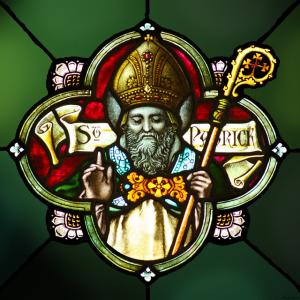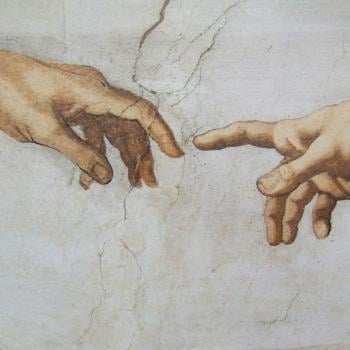
True Christian spirituality follows the way of the incarnation. The eschaton has become immanent with creation. The self-emptying which the Logos engaged was done in order that as a man, he could take on the cross and death, leading him to overcome death through his resurrection. And this is exactly the path which he has left behind, the noble path which we should take. We should divest ourselves from all attempts to make glory for ourselves, and that means, all attempts to promote ourselves above all others. We should detach ourselves from ourselves, doing so in order to be led to a particular end, our resurrection. Then we shall attain true glory, not through ourselves, but through grace. We are to die to the self, not because we are to nihilistically deny our good, but because we have embraced a false self, a self which we have constructed for ourselves and imposed it upon our true person; such self-denial is meant to reveal and free the person who we are. That is, that person, our true self, will be free to arise, capable of taking on grace and being deified by it. In that risen state, or even once we have established ourselves in the way and engage the process which leads to is, we can and should go out in the world, bringing the grace we have received and share it with the rest of the world. Thus, true Christian spirituality, unlike Gnostics and the so-called Benedict Option, does not deny the world in order to reject it and become separate from it. Rather, it has us deny our false understanding of the world, to retreat from it (possibly for a time) in order to find the grace which we need, and once we find it, to go into the world to lift it up. We are not to become attached to our detachment, to selfishly look only after ourselves – we are meant to use detachment as a tool in order to help us find ourselves. We should be concerned for the world and what happens to it because God cares for the world and is concerned with what happens to it. We are to deny the world insofar as structures of sin have taken over the world and impose themselves upon it, trying to have us identify the world with them; that means, we are to find our way beyond those structures so that, having transcended them, we will know the way to eliminate them in the world so that it can be freed from the bondage of sin and reveal, in the process, its true self. Then, it will be able to be filled with the grace of God. And, it should not be surprising, it is this kind of engagement with the world which produces great saints, among whom we find St. Patrick.
The life of St. Patrick is rather well-known. He was taken to Ireland as a slave in his youth. “As a youth, nay, almost as a boy not able to speak, I was taken captive, before I knew what to pursue and what to avoid.”[1] He was able to escape, return to his homeland, and become educated. He entered religious life, and was eventually made a bishop. With that grace, he was then able to fulfill his mission in life, a mission which was to take him back to Ireland in order to help the people there become free from the structures of sin which hurt them, and in that freedom, receive the grace of God. “And I was not worthy, nor was I such that the Lord should grant this to His servant; that after my misfortunes and so great difficulties, after my captivity, after the lapse of so many years, He should give me so great a grace in behalf of that nation – a thing which once, in my youth, I never expected nor thought of.” [2] He had to prepare himself for that mission, which is what he did, and so the years between his return to Britain and his mission to Ireland gave him, as it were, a retreat from the world, the rest which he needed in order to truly come to know himself. Then, with all that he had attained, with all the grace he received, he was capable of going back to Ireland in order to serve the people there:
On the other hand, I did not go to Ireland on my own accord, not until I had nearly perished; but this was rather for my good, for thus was I purged by the Lord; and He made me fit so that I might be now what was once far from me – that I should care and labour for the salvation of others, whereas then I did not even care about myself. [3]
And, it was because he was once himself a slave, he was able to understand the cruelty which the slaves experienced. He served them by promoting and supporting them, speaking on their behalf, pointing out, when he did so, the special needs of women because women slaves suffered the most of all:
But the greatest is the suffering of those women who live in slavery. All the time they have to endure terror and threats. But the Lord gave His grace to many of His maidens; for, though they are forbidden to do so, they followed Him bravely. [4]
Even though, once he left Ireland, he engaged, as it were, detachment from the world, that detachment was clearly not Gnostic or nihilistic, but rather, transformative. This is why he could and would return to Ireland. He did not engage an absolute denial of Ireland, but rather, he prepared himself to return to Ireland, to engage the world, as it were, to help the people in Ireland overcome the systematic structures of sin which impeded their own good. And that meant he could and would engage Ireland’s system government and its leaders instead of trying to disengage them and treat them with utter contempt. He did what was needed, including paying bribes (as was customary at the time) in order to make sure he was free to serve God there:
You know how much I paid to those who administrated justice I all those districts to which I came frequently. I think I distributed among them not less than the price of fifteen men, so that you might enjoy me, and I might always enjoy you in God. [5]
When he returned to Ireland to confront the systematic structures of sin which were in place, he was pragmatic in his approach. He knew that he had work within the system to circumvent it and break it down. “All the while I used to give presents to the kings, besides the fees I paid to their sons who travel with me.”[6] It worked. We remember St. Patrick because of the way he influenced the shape of Irish history. While there were Christians in Ireland before him, they were not able to transform Ireland in the way he did. He did not reject Ireland, and its people; he did not just flee from Ireland so as to have no concern for the good of the people there. Instead, he left in order to prepare himself so he could do what was needed for the transformation of Ireland itself. His approach to Ireland is the way we should approach the world itself. We should not reject the world, though we should reject the systematic structures of sin in the world. We should not reject the world, but in our work to transform it, we should recognize at times, we will have to be pragmatic, engaging the world even as we seek to transform it from within. That is, after all, what Christ himself did, which is why Christ was willing to pay taxes to Caesar. He used it to hint to us that while we pay Caesar because Caesar’s image is on the money used to pay taxes, Caesar likewise has God’s image in him and so owes God his very self. This shows the way government has its place but it should not be treated as an absolute authority. And so, just as we can learn this from Jesus, we can also learn this truth from Patrick; Patrick shows us the way to engage the word while undermining the systematic structures of sin. We are to do so, not separate from it, not outside of it, but from within. We must not deny the world with a nihilistic denial, thinking the world and all that is within it is meaningless – that is a Gnostic error, the error continued with the Benedict Option; rather, the world is good, and like Patrick, we are expected to reveal that good and promote it in our work. We are not to selfishly depart from the world, to go off in some retreat and try to find our salvation separate from everyone else – rather, we are to divest ourselves of all pretense, even of the pretense of separating from the world, so that we can truly be all we are meant to be, for in this way, we will bring the grace of Christ to all.
[1] St. Patrick, “The Letters of the Holy Bishop Patrick” in The Works of St. Patrick; St. Secundinus Hymn on St. Patrick. Trans. Ludwig Bieler PhD (New York: Newman Press, 1953), 23 [Book One: Confession].
[2] St. Patrick, “The Letters of the Holy Bishop Patrick,” 25 [Book One: Confession].
[3] St. Patrick, “The Letters of the Holy Bishop Patrick,), 29-30 [Book One: Confession].
[4] St. Patrick, “The Letters of the Holy Bishop Patrick,” 34-5 [Book One: Confession].
[5] St. Patrick, “The Letters of the Holy Bishop Patrick,” 38 [Book One: Confession].
[6] St. Patrick, “The Letters of the Holy Bishop Patrick,” 37[Book One: Confession].
Stay in touch! Like A Little Bit of Nothing on Facebook.
If you liked what you read, please consider sharing it with your friends and family!
N.B.: While I read comments to moderate them, I rarely respond to them. If I don’t respond to your comment directly, don’t assume I am unthankful for it. I appreciate it. But I want readers to feel free to ask questions, and hopefully, dialogue with each other. I have shared what I wanted to say, though some responses will get a brief reply by me, or, if I find it interesting and something I can engage fully, as the foundation for another post. I have had many posts inspired or improved upon thanks to my readers.













